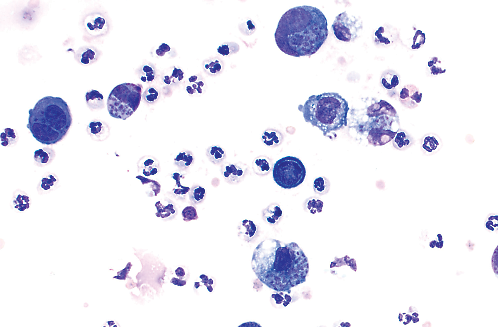Link Between Parasite, Suicide Remains a Mystery
Abstract
A third of the people in the world are positive for the parasite Toxoplasma gondii. So why is there a link between the parasite and suicidal behavior?
The parasite Toxoplasma gondii, which was previously linked with suicidal attempts in a small clinical sample, has also been linked with such attempts in a large prospective study.
The study’s senior researcher was Teodor Postolache, M.D., director of the mood and anxiety program at the University of Maryland. The results appeared in the November 2012 Archives of General Psychiatry.

Clusters of Toxoplasma gondii parasites can be seen within macrophages from a cytology smear.
The study included some 46,000 Danish women whose infants had been tested for T. gondii antibody levels at childbirth. Twenty-seven percent of the newborns were found to have a T. gondii infection, which reflected the same rate as in their mothers. The researchers then looked to see whether during subsequent years any of the women had attempted suicide. Almost 1,000 had, seven of whom completed a suicide. Finally the researchers assessed whether there was a connection between women’s T. gondii infection at the time of childbirth and later suicide attempts or completions.
There was, the researchers found. T. gondii-infected mothers had a relative risk of attempted suicide of 1.53 compared with noninfected mothers, and the risk appeared to increase as T. gondii antibody levels increased. For violent suicide attempts, the relative risk was 1.81, and for completed suicide, 2.05.
“This study is very interesting, and the prospective cohort design makes the findings . . . robust,” Paul Links, M.D., a professor of psychiatry at Western University in London, Ontario, Canada, and a suicide expert, told Psychiatric News.
But what does the association between T. gondii and suicidal behavior actually mean? “Association does not necessarily mean that there is a causal relationship.”
During an interview, Postolache concurred with Links. “We obviously hypothesized that T. gondii can affect the brain and lead to suicide attempts. But we did not rule out the possibility that somehow people at risk for suicide may have an increased risk of becoming T. gondii-positive. The most common risk factor for T. gondii in developed countries is undercooked meat. It could be that people who are impulsive [and thus prone to suicidal attempts] may also be more prone to eating a steak that is rare rather than well done.”
The results “also had an element of surprise,” Postolache said. “We thought that the relationship between T. gondii and suicidal behavior would have been stronger in those patients diagnosed with schizophrenia or bipolar disorder [since schizophrenia and bipolar disorder have been linked with T. gondii in the past]. In fact, what we did find was that those who had such illnesses were, to a certain degree, protected from the association. So the question is why.”
Unfortunately, until such questions are answered, the link between T. gondii and suicidal behavior will probably have little impact on day-to-day clinical psychiatry practice, Postolache pointed out.
The study was funded by the American Foundation for Suicide Prevention; the Stanley Medical Research Institute; and the VA Capitol Health Care Network Mental Illness Research, Education, and Clinical Center. ■
An abstract of “Toxolasma Gondii Infection and Self-Directed Violence in Mothers” is posted at http://archpsyc.jamanetwork.com/article.aspx?articleid=1206779.



